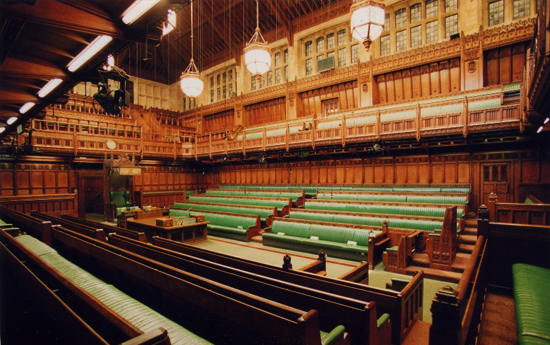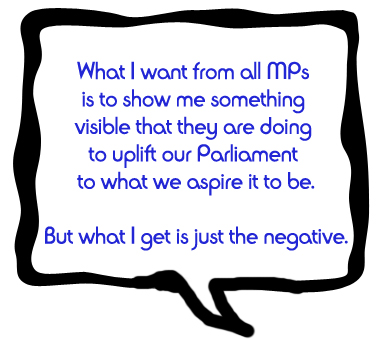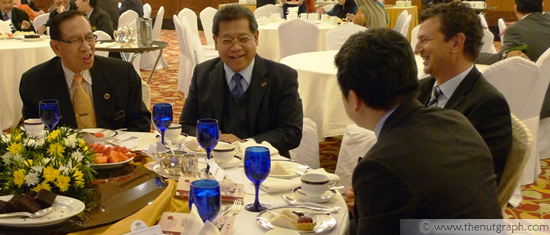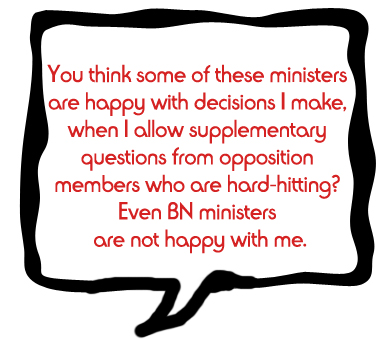
A PARLIAMENT unaccustomed to a larger and vibrant opposition bench has proven challenging for Dewan Rakyat Speaker Tan Sri
Pandikar Amin Mulia. Often, he is the target of criticism alleging his bias towards the executive.
In the first part of an interview with
The Nut Graph at his office in Parliament on 6 April 2011, Pandikar Amin talks about how he weighs his decisions as speaker and how he views the role.
TNG: What is the most difficult challenge being speaker of the Dewan Rakyat?
Pandikar Amin: When I exercise my discretion, which I really think is for the benefit of the people and for the good of Parliament itself, and yet my sincerity is doubted by parliamentarians who have their own personal views and agendas.
How do you deal with it?
I just have to be very patient. If it gets out of hand, I take stern action, and that’s when a few of them get suspended from the House.
Why should differences of opinion be seen as a challenge against the speaker?
Of course it is a challenge if neither side respects the other’s opinion. Having said that, you have to look at the differences in background of being a speaker in the Malaysian Parliament and a speaker in the [British]
House of Commons.
The speaker of the House of Commons is a position that has been there for hundreds of years. It evolved [out of] the differences of opinion between the monarchy and the masses. The position of speaker in the UK Parliament is an institution by itself which everyone respects, including the government.
It is not so in our case. For instance, the budget for running Parliament doesn’t come from a special fund. It is from the consolidated fund, under the Finance Ministry. The appointment of officers in Parliament is not by the speaker as an independent body; they are still appointed by the Public Service Commission.
In England, if a speaker stands for election, no political party will put a candidate [against the speaker], he [or she] will win automatically, because the view is that the speaker is running [in the election] as the speaker of Parliament. Once [we have] this kind of platform, it is conducive for the speaker to make decisions, and then you can get a Parliament like the House of Commons.

British House of Commons (Wiki commons)
What I want is for MPs to be practical. I have already made concessions as far as I am concerned. I was a very active politician. I was the Marudu Ketua Bahagian Umno. After I was appointed speaker of the Dewan Rakyat, I
resigned from all my political posts. To me, that is a sincere gesture. What I want from all MPs is to show me something visible that they are doing to uplift our Parliament to what we aspire it to be.
But what I get is just the negative. From the word “go” in 2008, SO (
Standing Orders of the Dewan Rakyat) 18 is being abused by the opposition for votes of
no-confidence against the government. (Editor’s note: SO 18 allows an MP to raise a an emergency motion to discuss a matter of public importance, but this may be refused by the speaker if the speaker finds it is not “definite, urgent and of public importance”.)
If MPs want to object to a decision you’ve made, they have to do it by way of a substantive motion under SO 43 requiring three days’ notice. Has that ever happened in our Dewan?
Any challenge must be done according to the SO. If you are not satisfied with the speaker’s ruling, the proper way is not to argue there and then. If you look at SO 43, it says that once a decision has been made by the speaker, the House cannot review it. Nobody can appeal it and ask the speaker to reconsider, because it just cannot be done under SO 43. It can only be done by an independent motion. But here, no. Once I make a ruling, they will scream that I am biased, that I’m being used by the executive. That kind of behaviour by itself is also against the SO.
How many times has such a motion challenging the speaker’s decisions been raised in our Parliament? The picture we get is that such motions are never allowed and that the speaker, therefore, cannot be challenged.
It has happened before. Under me, there was one such motion by Jelutong (Jeff Ooi Chuan Aun-DAP). He was not satisfied with one of my rulings so I advised him [if he was not happy] to bring a motion. So he brought the motion and it was put in the order paper on 15 Dec 2010.

But they always complain that it is pointless to bring a motion because it will never come to light, meaning it will never be debated. Because the government’s agenda is always discussed first in every session. Now, that is also not my fault because SO 15 says that’s how it’s to be done. The government’s agenda must be put first before the agenda of other MPs. [Those are] the rules.
Can you see my dilemma? If, for instance, I allow a substantive motion from the opposition, and it gets discussed and then the House must vote on it, the government will win again because it has the numbers. So what is the point? I will be accused again and the government will be accused of arm-twisting the minority. There’s a quote by a Canadian speaker that “the government will always have its way and the opposition will have its say”. That’s just the way it is.
So Jelutong brought the motion, it was put in the order paper, but until now the House has not come to it yet because every day it is the government’s agenda that is discussed first. That is the rule in the SO and the MPs know it and they should not accuse me of being biased. Unless the rules are amended, there is nothing I can do. That’s what I’m saying: to have a very fair speaker, you must provide the platform for him to act accordingly.
Do you think there is a need for check and balance on the speaker?
The speaker has to follow the procedures in the SO.
In the UK Parliament’s question time,
Private Notice Questions are first discussed by both the opposition and government, and then they will inform the speaker. But in our case, in accordance with our SO, all questions are predetermined with the MPs who want to ask questions giving two weeks’ notice so that the government ministers will have time to gather the necessary answers. The questions are all laid out in the order paper. So we practise parliamentary democracy, but our procedures differ.
If the PR comes to power, will they change the SO immediately to have a really independent speaker? If that is what they intend to do, why don’t they start practising it in their states?

Pandikar at the book launch of The Nut Graph's "Understanding the Dewan Rakyat" on 23 March 2011
Whenever a motion comes before me, I seek all the information from relevant ministries and authorities. From there I form my opinion. To give credit to the prime minister and the chief whip, the deputy prime minister, they never get involved. I allowed, under SO 18(1), motions to debate the
strike by fisher[folk], the rising
price of rice and the
Bukit Antarabangsa landslide, and also the (
Genting Sempah) bus crash. These things are urgent, and I also want the government to be responsible and answerable.
But the opposition are very fond of reacting if I reject one of their motions. They will immediately hold a press conference outside to complain about it.
[But look at the motions brought]. There was a commotion over a road closure where [a few] people got injured, and the
Serdang MP brought it for debate under SO 18(1). If I were to allow that, then I would have to allow every fight that breaks out to be debated in Parliament. Then there was a motion to discuss a
collapsed bridge in Perak where a few students died. But the deputy prime minister had already gone there, the problem was already being attended to.
If I were to allow that motion, I would have to allow motions on all sorts of other things. Now I’ve just received another motion to debate the
death of a seven-year-old boy under his religious teacher’s care. If I allow this, would I then have to allow every case of child abuse or death in the country to be debated?
Do you try to ensure that your decision to allow or not allow motions is not perceived as biased?
There is no way I can make sure it’s not perceived as such. You think some of these ministers are happy with decisions I make, when I allow supplementary questions from opposition members who are hard-hitting? Even BN ministers are not happy with me. As speaker I can choose anyone to ask a supplementary question. I could pick an MP whom I know is not hard-hitting. There was once a parliamentary question directed at the prime minister. Many MPs stood up to ask a supplementary question. I could have called a weaker MP, but I called Bukit Gelugor (Karpal Singh-DAP) because to me, I am giving opportunity to the government to explain.
The record shows that most opposition motions are rejected.
There are also motions by the backbenchers which I have rejected because of SO 15 that the government’s agenda must come first. But they don’t highlight it or hold a press conference to complain about it. Even backbenchers face the same thing – their motions never see the light of day because they get pushed down the list on the order paper – that opposition MPs complain of.
There’s another thing I’m doing. The way questions in the order paper are arranged. There is nothing in the SO that says I have to order parliamentary questions a certain way. But I order it so that opposition and government MPs can take turns in asking their questions. First, a question by a BN MP, followed by a question from an opposition MP. I do the same with supplementary questions. So, I’m already doing something positive: a signal to parliamentarians that I am departing from our normal style of Malaysian politics. So they must also try to do something positive.
 On your first day as speaker, you didn’t allow MPs to ask any supplementary questions, citing “time constraints”. But aren’t supplementary questions an important way for MPs to question and scrutinise the government on its performance and policies?
On your first day as speaker, you didn’t allow MPs to ask any supplementary questions, citing “time constraints”. But aren’t supplementary questions an important way for MPs to question and scrutinise the government on its performance and policies?
Under our SO 24(3), the speaker may allow not more than three supplementary questions. The text says “may”, not “shall”. This is a matter of interpretation. (Editor’s note: Under SO 99, the speaker’s interpretation of the rules is final.)
On that day, at the time, there had been a commotion going on for almost one hour, all because
Bukit Gelugor took issue with [how some MPs did not raise their hands properly when they were sworn in]. We had not yet even started the meeting. When we finally did, I wanted to be fair to all the other MPs who had posed parliamentary questions as listed on the order paper. Shouldn’t we also let others further down the order paper have their questions answered?
So that was the reason I didn’t allow supplementary questions on that day. My decision is based on my interpretation of the SO which states that I “may” allow up to three questions. Not “shall”. Even then, the backbenchers stood up to complain against me. But it’s a decision I still stand by. If MPs are not satisfied, they can file a motion using SO 43, not by ridiculing me.
You’ve mentioned that the law must first provide for the speaker to be impartial, such as in funding and appointment of staff. But the law as it is, doesn’t stop you from making impartial decisions.
There is no such law. I’m not the government, I can’t make such law. It must be the executive who says, “We want to have an independent speaker’s office. So therefore the budget must not come from the consolidated fund, it must be from a separate fund.” And all the officers in Parliament must be appointed separately; like the police or army, they have their own system of recruitment. Provide that, give that to whoever sits in the speaker’s chair. So how can you blame me when that is the system that has always been there? I can’t change the system alone without the government’s backing.
In one word, describe your job as speaker:
Dilemma. Always in a dilemma. Whatever I do is perceived as not right.

























